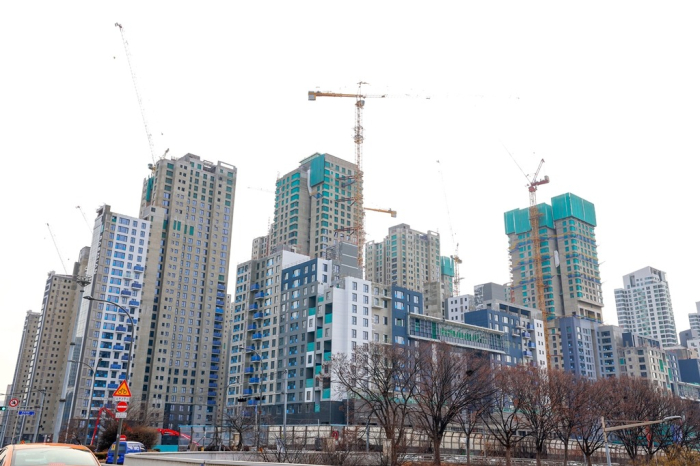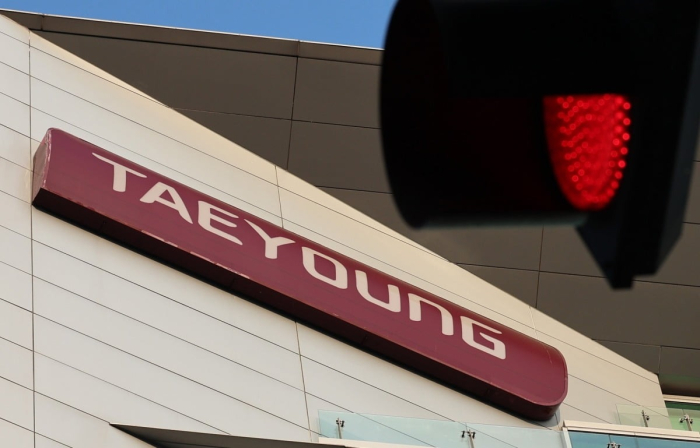Corporate restructuring
Korean builders scramble to ease liquidity crunch woes
Creditors are disappointed by Taeyoung’s rescue plans; FSS Governor asks them come up with new measures by end-weekend
By Jan 05, 2024 (Gmt+09:00)
4
Min read
Most Read
LG Chem to sell water filter business to Glenwood PE for $692 million


KT&G eyes overseas M&A after rejecting activist fund's offer


Kyobo Life poised to buy Japan’s SBI Group-owned savings bank


StockX in merger talks with Naver’s online reseller Kream


Meritz backs half of ex-manager’s $210 mn hedge fund



South Korean builders in financial distress are struggling to alleviate concerns over a potential liquidity crisis, which could put the already ailing construction sector in Asia’s fourth-largest economy at risk, as a debt workout program filed by troubled Taeyoung Group is stalled over its self-rescue plans.
Local analysts expect Dongbu Corp., Shinsegae Engineering & Construction Co. and Lotte Engineering & Construction Co. to face a credit crunch due to increasing financing costs and delayed building projects.
Dongbu said on Friday it raised 300 billion won ($227.9 million) in the fourth quarter of last year to improve its financial conditions, defying such worries.
“We secured 300 billion won preemptively by collecting overseas construction costs, money for completed sites and loans,” Dongbu said in a statement. “We have maintained financial stability through the liquidity.”
“The company plans to execute business loans at low-interest rates as planned while aiming to reduce interest expenses and debt repayment burden by paying back loans for working capital with higher borrowing costs,” it said.
Dongbu also saw few risks on its contingent liabilities related to project financing as those liabilities totaled only about 200 billion won on a warranty limitation basis as of the third quarter of 2023, far less than the country’s project financing market size of 134.3 trillion won.
Some analysts said the company’s cash equivalents slightly fell in the July-September period, but Dongbu said that the temporary decline resulted from the repayment of matured high-interest debt securities to reduce financing costs.
The builder said its situation is different from those of its debt-ridden rivals as most of its construction sites with project financing reported high sales rates and secured money for works.
“It was proven by Seoul Credit Rating, which maintained its rating in December last year with the view that Dongbu’s PF risks are limited,” said a Dongbu official, referring to project financing. The rating agency kept its rating on Dongbu at A3+.
Dongbu expected new projects with low costs of sale, which will be launched this year, to improve its profitability.
LOTTE SAYS IT HAS SUFFICIENT LIQUIDITY
Lotte on Thursday also said it has secured enough liquidity to manage contingent liabilities related to project financing.
“Of the 3.2 trillion won of project financing loans expiring in the first quarter of this year, 2.4 trillion won will be rolled over through a fund to be created by banks and financial services firms,” Lotte said in a statement. “The remaining 800 billion won will be refinanced in the first quarter.”
Lotte and Dongbu’s statements were released after creditors of Taeyoung Group, saddled with 5.6 trillion won in debt and loans it has guaranteed, were disappointed with the construction-to-media conglomerate’s self-rescue plans.

The group filed for a debt workout program last week as its core company Taeyoung Engineering & Construction Co. owes about 1.7 trillion won to lenders, including mutual savings banks, as of the end of November, in addition to 3.9 trillion won of debt it has guaranteed for contractors.
The debt-ridden group had vowed to take measures for fresh capital such as a sale of its entire stake in Ecorbit Co., a 50:50 joint venture with global private equity giant KKR & Co.. But it hopes to keep Seoul Broadcasting System (SBS), the country’s leading broadcaster, under its wing.
Taeyoung Group failed to satisfy creditors including the state-run Korea Development Bank as those measures did not include a possible sale of a stake in SBS and contributions from the group owner’s family.
The group later said the family pledged to contribute 48.4 billion won, but far less than creditors’ request of more than 300 billion won.
South Korea’s authorities also stepped up warnings against the group.
“It is hard for creditors to agree on the self-rescue plans pledged by Taeyoung (group) earlier,” said Financial Supervisory Service (FSS) Governor Lee Bokhyun told reporters on Thursday. “The authorities are concerned and wary of Taeyoung Group, which has not kept its minimum promises for support to the losses of its suppliers, subcontractors and creditors.”
Lee also said the group must come up with new rescue plans that can convince creditors by the end of the weekend.
Write to Oh-Sang Yoo at osyoo@hankyung.com
Jongwoo Cheon edited this article.
More to Read
-
 Corporate restructuringTaeyoung files for debt workout; offers to sell stake in KKR JV
Corporate restructuringTaeyoung files for debt workout; offers to sell stake in KKR JVDec 28, 2023 (Gmt+09:00)
3 Min read -
 ConstructionKKR expected to buy 100% stake in Taeyoung Industry
ConstructionKKR expected to buy 100% stake in Taeyoung IndustryOct 25, 2023 (Gmt+09:00)
3 Min read -
 ConstructionTaeyoung to sell cash cow to shore up ailing construction arm
ConstructionTaeyoung to sell cash cow to shore up ailing construction armOct 18, 2023 (Gmt+09:00)
2 Min read -
 Corporate bondsLotte to spend $651 mn to save affiliate from Legoland woes
Corporate bondsLotte to spend $651 mn to save affiliate from Legoland woesNov 09, 2022 (Gmt+09:00)
2 Min read
Comment 0
LOG IN


